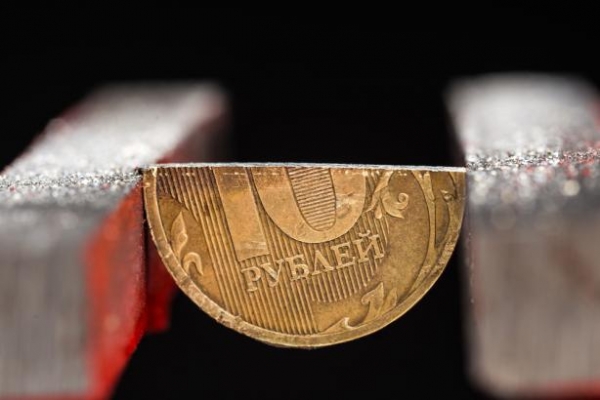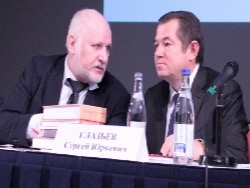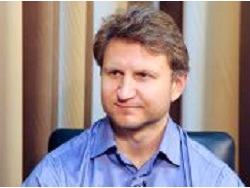
Speculation international investors increasing rate of the Russian ruble and other Russian assets are a measure of their despair. Although rumors about the upcoming large-scale Russian offensive in Ukraine, is likely to be unfounded, nothing in the Russian economy now may not be the impetus for lifting of trading assets, and it will take not much time before the Central Bank of Russia is forced to weaken the Russian currency.
Since the beginning of year the ruble was the third in the list of currencies that bring the most money, carry traders, who borrow us dollars to buy bonds in other currencies.
The fluctuations of the ruble repeat variations in the price of oil, which is quite natural since Russia is the world’s largest exporter of energy resources, but it is going through fairly long periods of recovery in the market when the price of oil falls. One such period started in early July.
The actions of carry traders are the main reason that the Russian currency has now strengthened its position. Analysts are trying to find signs that the Russian economy staying in recession for the second year in a row, maybe starting to recover, however, what they discover is hardly evidence of the strengthening of the ruble. In the second quarter of this year, production volumes in Russia decreased by 0.6% — most analysts believed that they will fall by 0.8%. Compared to the same period of the previous year, Russia recorded a small increase in the level of electricity consumption and the volume of traffic. However, these minor changes can hardly be regarded as evidence of recovery. Taking into account seasonal fluctuations in the second quarter the volume of industrial production declined slightly. The volume of retail banking and investment sales were far below last year’s level.
The Russian government has not taken any steps to stimulate economic growth: it did not stimulate demand, increase spending, to soften the law or to strengthen the protection of investors ‘ rights. The Central Bank, in turn, were slow to reduce lending rates. In late July, the leadership took the decision to leave the key rate at the level of 10.5%, which allows carry traders to continue to obtain high profits and prevents businesses to set aside funds for further investment. This year, the size of the key rate was changed only once, in June, when it was reduced from 11% to 10.5%.
The Central Bank tries to fight inflation. According to his forecasts, in a year the inflation rate should fall below the level of 5% — quite a noble goal, but not necessarily consistent with the needs of the government. The 2016 budget is designed so that the price of oil will not fall below 3 165 rubles per barrel is 48.75 current dollars. In the first half of the year the price of Russian oil averaged 37,80 dollars per barrel — that is, the budget had a much larger deficit than expected, and this without taking into account the exports of other energy resources, which also suffered from too-high ruble exchange rate.
In late July, the economic adviser to Putin, Andrei Belousov, who sincerely believes in the effectiveness of monetary stimulus, complained that the ruble too has strengthened its position, President Vladimir Putin also expressed his concern about this — but not so impressive that the Central Bank felt the need to respond to his words. Moreover, the Central Bank made a statement that he has no plans to weaken the ruble.
The Central Bank could help the government, began to buy dollars on the open market to increase foreign exchange reserves. To some extent he already has: this year the volume of foreign exchange reserves gradually increased. However, this is not enough to resist the pressure from carry traders.
In Russia there are many banking analysts, who will tell you what the current exchange rate is justified. Russia’s dependence on oil exports had a slight decrease when the price fell on it. This year Russia became the world’s largest exporter of wheat. Its agricultural sector has benefited from the embargo on Western food and from the relative weakness of the ruble in the past year. The economy of Russia is undoubtedly more stable than in the period of falling oil prices and directly after the annexation of Crimea. Investors have become accustomed to the current status of Russia: it is neither a rogue state nor economic center of power is more of a country, which is quite suitable for trade, while in more secure countries rates negative.
It might be a mistake. The Russian economy is stuck in limbo. While Putin runs the country, he is not prepared to allow further expansion of economic freedom or to start the privatization of the greater part of the raw material economy of Russia. Privatization of the shares of oil companies, which, according to the plan, should cover the budget deficit this year is not as smooth as intended. Igor Sechin, head of Rosneft — the largest oil company in Russia whose shares the government wants to sell claims on shares of “Bashneft”, which is also preparing to sell part of its shares. Own conditions for the privatization of “Rosneft” is designed so that new investors had less influence on the process of management of the company.
Putin is busy with the changes within his team: he has recently demonstrated a willingness to dismiss his old friends and comrades and to appoint to the key posts of the new generation of bureaucrats, many of whom come from the ranks of the security services. On Friday, August 12, Putin has dismissed the head of his administration Sergey Ivanov — one of his closest associates for many years — replacing his former diplomat Anton Vaino. However, in matters of the economy, Putin, apparently, cannot accept the changes in the rigid structure that he created. He can conduct interviews with experts on alternative scenarios, but he’s much more interested in their geopolitical games in Syria and Ukraine, than to try to rebuild the Russian economy.
This means that the government and the Central Bank will eventually be forced to agree to the weakening of the ruble to cover the budget deficit. The targets for inflation will again be shifted: they are, as the purchasing power of Russians are for Putin is much less important than his ability to maintain control over all aspects of life in his country. After the September parliamentary elections, which are almost guaranteed to win the Pro-Putin party, United Russia, will have fewer reasons to interfere with the rapid growth of the prices. Then the Central Bank may again try to influence the exchange rate.








